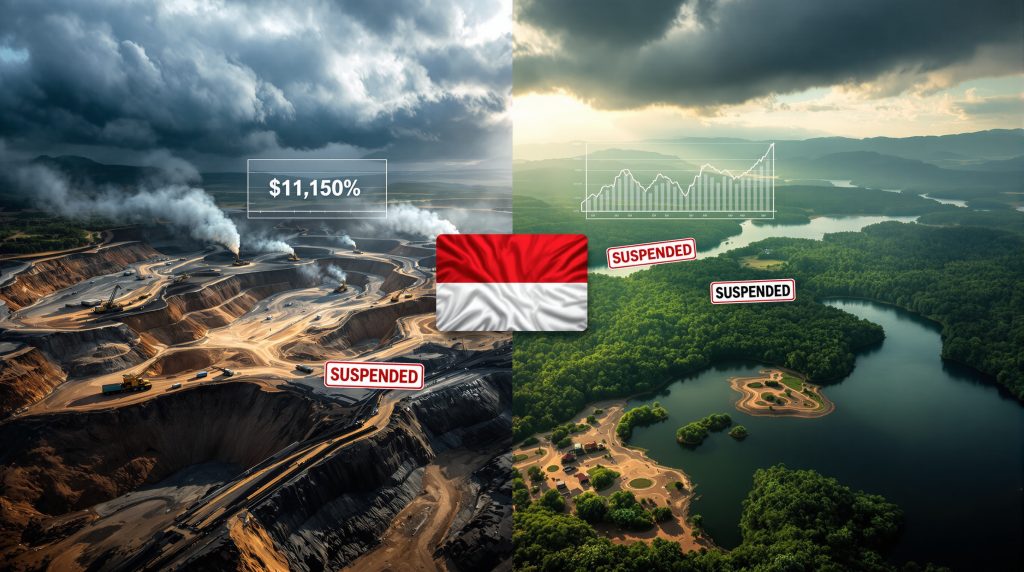How Are Indonesian Nickel Sanctions Reshaping Global Metal Markets?
Indonesia's recent enforcement actions against nickel producers have sent ripples through global markets, creating supply uncertainties and price volatility. The Ministry of Energy & Mineral Resources (ESDM) has implemented sweeping sanctions affecting 25 nickel mining operations in Southeast Sulawesi province, part of a broader crackdown that suspended 190 general mining licenses for up to 60 days.
These sanctions represent a significant escalation in Indonesia's environmental enforcement efforts, targeting companies that failed to meet critical requirements related to site reclamation, post-mining financial guarantees, and compliance with previous warning notices.
The global significance of these actions cannot be overstated, as Indonesia holds the position of world's leading nickel producer. With approximately 30% of global nickel importance & uses and producing nearly 1.6 million metric tons annually, any disruption to Indonesian supply chains has immediate international repercussions.
Regulatory Framework Intensifies
The current sanctions follow an established pattern of increasingly stringent oversight. Companies facing sanctions had received multiple warnings – initial notices in December 2024 followed by secondary warnings in August 2025. Only after continued non-compliance did the ESDM implement the current suspensions.
Beyond license suspensions, Indonesian authorities have taken additional enforcement steps including land seizures at Weda Bay Nickel and property confiscation from Tonia Mitra Sejahtera, both resulting from inadequate forestry permits.
Industry analysts note this environmental crackdown represents a pivotal shift in Indonesia's approach to resource management. Previously focused primarily on production expansion and economic development, the government now appears to be balancing these priorities with more robust environmental protection measures.
What Triggered Indonesia's Environmental Crackdown?
Escalating Regulatory Pressure
The Indonesian government's enforcement surge stems from multiple factors converging to create unprecedented regulatory pressure on the mining sector. The series of warning letters issued to nickel producers in December 2024 and August 2025 indicate a systematic approach to compliance enforcement rather than spontaneous action.
Companies had multiple opportunities to address environmental shortcomings before facing sanctions. The ESDM's decision to move forward with suspensions reflects the government's growing impatience with operators failing to meet established standards.
Land Seizures and Permit Issues
The land seizures at Weda Bay Nickel and the property confiscation from Tonia Mitra Sejahtera highlight the government's commitment to addressing not just operational compliance but also fundamental permitting requirements. These actions target operators expanding beyond their legally permitted boundaries or operating without proper authorizations.
The decision to enforce forestry permit requirements signals increased coordination between different regulatory bodies within Indonesia's government structure. This cross-departmental approach represents a more comprehensive regulatory framework than previous enforcement efforts.
International Criticism as a Catalyst
Indonesia's heightened enforcement coincides with growing international scrutiny of its mining practices. Countries like Australia have repeatedly criticized Indonesia's environmental oversight, particularly as production rapidly expanded to meet surging global demand for nickel in electric vehicle batteries and stainless steel production.
This international pressure creates both reputational and economic incentives for Indonesia to demonstrate more responsible resource management. As global supply chains face increasing scrutiny regarding environmental and social governance standards, Indonesia's actions may partly aim to protect market access for its mineral exports.
What Are the Immediate Market Consequences?
Supply Chain Disruptions
The 60-day suspension period has created significant uncertainties throughout global nickel supply chains. With 25 operations in Southeast Sulawesi province suspended, buyers worldwide are reassessing their procurement strategies and seeking alternative sources.
These disruptions come at a particularly sensitive time for global markets, coinciding with increased demand for nickel in electric vehicle manufacturing and renewable energy infrastructure. Companies reliant on consistent Indonesian nickel supply now face potential shortfalls and delivery delays.
Manufacturing sectors particularly vulnerable to these disruptions include stainless steel production, battery manufacturing, and specialized alloy fabrication. With limited immediate alternatives to Indonesian supply, these industries may face production constraints and increased input costs.
Price Volatility and Market Reactions
Nickel markets have reacted strongly to the sanctions announcement, with trading patterns showing increased volatility. Market analysts are closely monitoring price movements as traders attempt to assess both the short-term impact of the suspensions and potential longer-term shifts in Indonesian mining industry evolution.
This volatility particularly affects downstream industries that lack significant inventory buffers or flexible procurement options. Companies with fixed-price contracts may face margin pressures if forced to secure alternative supplies at premium prices.
Parallel Copper Market Pressures
The Indonesian nickel sanctions coincide with a separate significant disruption in Indonesia's copper sector, creating a compound effect on global metal markets. The Grasberg mine, representing approximately 3% of global copper market insights, suffered a catastrophic mudslide that prompted operator Freeport-McMoRan to declare force majeure on contracted supplies.
The financial impact of this incident is substantial, with Q3 output reduced by 4% from previous estimates and 2026 production potentially 35% lower than pre-incident projections. Approximately 800,000 metric tons of wet material entered the mine during this unprecedented event, causing extensive damage to production infrastructure.
These parallel disruptions in copper and nickel highlight the vulnerability of global metal markets to regulatory and operational disruptions in major producing regions. The combined effect has intensified market volatility hedging across multiple industrial sectors.
How Is Indonesia Balancing Resource Development with Environmental Protection?
Evolution of Environmental Enforcement
Indonesia's approach to environmental regulation has undergone a significant evolution in recent years. Historically focused primarily on production expansion and economic development, the government has increasingly recognized the long-term costs of unregulated mining activities.
This evolution reflects growing awareness of mining's environmental impacts on Indonesia's diverse ecosystems. Uncontrolled nickel mining can cause deforestation, soil erosion, water pollution, and habitat destruction – issues that have gained increased public and political attention.
The current enforcement actions represent a more sophisticated regulatory approach, targeting specific compliance issues rather than implementing blanket restrictions. This targeted enforcement allows continued operation by compliant producers while addressing problematic actors.
Reclamation Requirements and Financial Guarantees
The sanctions specifically target failures related to site restoration planning and financial assurances for post-mining remediation. These requirements represent core elements of sustainable mining practice, ensuring operators take responsibility for environmental impacts throughout the project lifecycle.
Site reclamation plans typically include detailed procedures for landform reconstruction, topsoil management, revegetation, and water management systems. The financial guarantees required by Indonesian regulations ensure funds are available for mining reclamation trends even if mining companies cease operations or face financial difficulties.
By enforcing these specific requirements, Indonesian authorities are addressing both current environmental management and long-term restoration needs. This approach represents a more sustainable development model that considers both economic benefits and environmental costs.
Forestry Protection Measures
The land seizures highlight Indonesia's increasing focus on protecting forest resources from unauthorized mining expansion. Indonesia contains some of the world's most biodiverse tropical forests, which face pressure from multiple development sectors including mining, agriculture, and logging.
Proper forestry permitting ensures mining activities undergo appropriate environmental impact assessment and implement required mitigation measures. This regulatory framework aims to prevent uncontrolled expansion into sensitive ecological areas and ensure mining operations remain within approved boundaries.
The enforcement of these permits demonstrates coordination between Indonesia's mining and forestry regulatory bodies, representing a more integrated approach to resource management than in previous regulatory periods.
What Are the Long-Term Implications for Global Nickel Supply?
Reshaping Production Standards
The sanctions signal potential long-term changes in Indonesia's nickel sector operational requirements. Companies operating in Indonesia will likely face increased pressure to demonstrate environmental compliance through more rigorous documentation, monitoring programs, and remediation activities.
These higher standards may increase production costs through additional environmental management expenses, more comprehensive monitoring requirements, and enhanced reclamation activities. However, they may also drive technological innovation in more efficient and less environmentally harmful extraction and processing methods.
The sanctions particularly highlight potential production constraints in environmentally sensitive areas. Future development may face more stringent approval processes, especially near protected forests, watersheds, or areas with high conservation value.
Investment Implications
The regulatory shift creates both challenges and opportunities for investors in Indonesia's nickel sector. Companies with established environmental management systems and robust compliance programs may gain competitive advantages as enforcement increases.
Forward-thinking operators may also benefit from potential premium pricing for responsibly sourced nickel. As downstream industries face increasing pressure to demonstrate sustainable supply chains, verifiably responsible production may command market premiums.
Investors must now factor regulatory compliance into risk assessments when evaluating Indonesian nickel assets. Projects lacking comprehensive environmental management systems or operating in sensitive areas may face increased regulatory scrutiny and potential operational disruptions.
Supply Diversification Pressures
Indonesia's dominant market position means these disruptions may accelerate global efforts to diversify nickel supply sources. Countries with significant nickel resources but less developed production, such as Australia, Canada, and Brazil, may see increased investment interest as buyers seek to reduce reliance on Indonesian supply.
Research into nickel substitutes for certain applications may also accelerate, particularly in sectors where material properties allow flexibility. Alternative battery chemistries and manufacturing techniques could reduce dependence on nickel in some applications.
Recycling initiatives may gain additional momentum as a means to reduce primary nickel demand. Advanced recycling technologies for recovering nickel from batteries, catalysts, and electronic waste could become increasingly economically viable if primary supply constraints persist.
How Are Indonesian Sanctions Affecting Global Nickel Pricing?
Price Response Mechanisms
The market has responded to the Indonesian nickel sanctions through multiple pricing mechanisms. Short-term price increases reflect immediate supply uncertainties, with spot prices showing particular sensitivity to announcements about the scope and duration of the suspensions.
Volatility has increased as traders assess the likely impact on physical metal availability. This uncertainty particularly affects industries without significant inventory buffers or flexible procurement options.
Forward contracts have seen adjustments to account for potential longer-term impacts if sanctions extend beyond the initial 60-day period or lead to permanent closure of non-compliant operations. This forward curve adjustment reflects market concerns about sustained supply disruptions.
Regional Price Differentials
The sanctions have created pricing disparities across regional markets. Material from unaffected Indonesian operations may command premium pricing due to supply constraints and verification of regulatory compliance.
Producers in unaffected regions have potential cost advantages if they can rapidly increase output to meet demand from buyers seeking alternatives to Indonesian supply. However, limited spare production capacity in alternative locations constrains this response mechanism.
Trading houses with existing inventory positions may benefit from price appreciation, while those with fixed-price forward sales face potential margin compression if forced to source higher-priced replacement material.
Comparative Impacts Across Metal Markets
The coinciding disruptions in both nickel and copper markets create complex dynamics for metal markets and downstream industries. Resource allocation challenges affect miners with diversified portfolios, potentially forcing operational prioritization decisions based on relative market conditions.
Manufacturers requiring both metals face compounding supply challenges. Industries particularly affected include electrical equipment manufacturing, construction, and renewable energy infrastructure, which require both nickel-containing alloys and copper components.
These parallel disruptions have prompted strategic stockpiling by some manufacturers concerned about sustained shortages. This precautionary inventory building may temporarily amplify price pressures before markets establish new equilibrium levels.
What Environmental Concerns Drove These Regulatory Actions?
Water Quality Issues
Nickel mining operations in Indonesia have faced growing criticism for their impact on water resources. Potential water quality issues include acid mine drainage, sedimentation, and the release of heavy metals and processing chemicals into waterways.
These impacts particularly affect local communities dependent on clean water for drinking, agriculture, and fishing. Indonesia's tropical climate, with high rainfall and numerous waterways, makes water management particularly challenging for mining operations.
The regulatory focus on site reclamation and financial guarantees directly addresses these concerns by ensuring proper water management systems during operations and appropriate remediation after mining concludes.
Deforestation Concerns
Nickel mining has contributed to deforestation pressures in Indonesia, particularly when operations expand beyond permitted boundaries or operate without proper forestry authorizations. The land seizures at Weda Bay Nickel and Tonia Mitra Sejahtera directly address these unauthorized expansions.
Deforestation impacts extend beyond immediate biodiversity loss to include soil erosion, altered watershed function, and reduced carbon sequestration. These effects can persist long after mining operations conclude if proper reclamation is not implemented.
Indonesia's global environmental commitments, including climate change mitigation pledges, create additional pressure to address deforestation from mining activities. The enforcement actions demonstrate efforts to align resource development with these broader environmental goals.
Rehabilitation Failures
The sanctions specifically target insufficient site restoration after mining activities and inadequate financial provisions for cleanup. These requirements address the mining industry's historical pattern of abandoned or inadequately remediated sites.
Without proper reclamation, former mining areas can remain environmentally degraded for decades, with persistent issues including erosion, contaminated soils, damaged watersheds, and lost productive capacity. The financial guarantees required by regulations ensure resources for remediation remain available regardless of a company's financial status.
By targeting these specific compliance issues, Indonesian authorities are addressing both immediate environmental management and long-term ecosystem recovery needs. This approach represents a more sustainable development model that considers environmental costs throughout the mining lifecycle.
How Might These Sanctions Reshape Indonesia's Resource Strategy?
Balancing Economic and Environmental Priorities
Indonesia's approach reflects evolving priorities in its resource development strategy. While maintaining economic benefits from nickel production remains crucial, the government appears increasingly willing to enforce environmental standards that may temporarily constrain output.
This balancing act responds to multiple pressures, including domestic environmental concerns, international market expectations, and global climate commitments. The enforcement actions signal that Indonesia's resource development model is moving toward more sustainable practices.
The strategic shift may actually strengthen Indonesia's long-term market position by aligning with global trends toward responsible sourcing. As downstream industries face increasing pressure to demonstrate sustainable supply chains, Indonesian producers meeting enhanced environmental standards may gain competitive advantages.
Value-Added Processing Focus
The sanctions align with Indonesia's broader strategy to move up the value chain in nickel processing and develop domestic manufacturing capabilities. By establishing more robust environmental standards, Indonesia potentially positions its processed nickel products for premium markets with stringent sourcing requirements.
This value-added strategy includes development of nickel processing facilities, battery component manufacturing, and potentially electric vehicle production. These downstream industries typically face greater scrutiny regarding environmental practices than raw material production.
By addressing environmental concerns at the mining stage, Indonesia potentially strengthens market access for its processed nickel products. This approach captures more economic value from raw materials while potentially reducing overall environmental impacts through more efficient resource utilization.
Regulatory Framework Evolution
The enforcement actions signal potential changes in Indonesia's governance approach for the mining sector. More consistent application of existing regulations appears to be replacing the previous pattern of intermittent enforcement followed by prolonged periods of minimal oversight.
Enhanced environmental standards may be forthcoming, potentially including stricter water quality requirements, more comprehensive reclamation planning, and enhanced monitoring obligations. These developments would align Indonesia's mining regulations more closely with international best practices.
Greater transparency in compliance monitoring seems likely, potentially including public reporting of environmental performance metrics and compliance status. This transparency would support Indonesia's efforts to demonstrate responsible resource management to international markets.
What Should Investors and Market Participants Monitor Going Forward?
Key Indicators to Watch
Market participants should focus on several critical indicators to assess the sanctions' ongoing impact. The duration of current sanctions and potential extensions beyond the initial 60-day period will significantly affect supply availability and market sentiment.
Compliance responses from affected companies deserve close attention, particularly any announcements regarding remediation plans, financial guarantee arrangements, or operational modifications. These responses will indicate how quickly suspended operations might resume production.
New regulatory announcements from Indonesian authorities could signal broader changes in the country's approach to mining oversight. Particularly important would be any modifications to environmental standards, permitting requirements, or enforcement mechanisms.
Development of alternative supply sources, including expansion at existing operations outside Indonesia or acceleration of new projects, will influence medium-term market balance. Capacity utilization rates at unaffected nickel operations globally may increase in response to supply constraints.
Compliance Strategies for Producers
Companies operating in Indonesia may need to implement enhanced compliance strategies to mitigate regulatory risks. Increased investments in environmental compliance should include comprehensive site management systems, regular independent audits, and dedicated compliance personnel.
Improved transparency regarding environmental impacts would support more constructive relationships with regulators and communities. This transparency might include regular public reporting, community monitoring programs, and open-access environmental data.
More robust site rehabilitation planning will be essential, including detailed closure plans developed early in project lifecycles and regularly updated throughout operations. These plans should include specific revegetation strategies, water management systems, and post-closure land use options.
Establishing stronger relationships with regulatory authorities through regular consultation, proactive compliance reporting, and participation in industry sustainability initiatives can reduce regulatory uncertainty and improve operational continuity.
Market Adaptation Mechanisms
The global nickel market will likely respond through several adaptation mechanisms. Diversification of supply chains will be a priority for major consumers, potentially including development of alternative sources, inventory building, and more flexible procurement strategies.
Premium pricing for demonstrably sustainable production may emerge as buyers seek to secure compliant material and mitigate supply risks. This differentiation could create a two-tier market with price premiums for verified environmentally responsible production.
Enhanced due diligence regarding environmental compliance will become increasingly important in procurement decisions. Buyers may implement more comprehensive supplier assessment programs including verification of regulatory status, site inspections, and compliance certification requirements.
These adaptations will reshape market dynamics beyond the immediate impact of the current sanctions, potentially creating a more resilient but also more complex global nickel market.
FAQ: Indonesian Nickel Sanctions
How long will the current sanctions remain in effect?
The current sanctions may last up to 60 days, though extensions are possible if companies fail to address compliance issues related to site reclamation and post-mining guarantees. The actual duration for individual operations will depend on their specific compliance response and remediation efforts.
Which regions of Indonesia are most affected by these sanctions?
The Southeast Sulawesi province has been particularly impacted, with 25 nickel mining operations facing suspension. This region represents one of Indonesia's most significant nickel production areas with extensive laterite deposits suitable for both traditional smelting and newer hydrometallurgical processing methods.
How do these sanctions compare to previous regulatory actions?
These sanctions represent a significant escalation compared to previous enforcement efforts, affecting a larger number of operations and implementing more severe penalties. Previous regulatory actions typically involved warning letters and limited suspensions rather than the current broad-based enforcement affecting 190 general mining licenses.
What steps must companies take to have sanctions lifted?
Companies must demonstrate compliance with site reclamation requirements and establish adequate post-mining guarantees to satisfy regulatory authorities. This typically involves submitting detailed remediation plans, providing financial assurance instruments, and potentially implementing immediate corrective actions at operating sites.
How might these sanctions affect nickel prices in the coming months?
Market analysts anticipate continued price volatility with potential upward pressure if sanctions extend beyond the initial 60-day period. The price impact will depend on several factors, including the speed of compliance by suspended operations, adaptation by consumers to alternative sources, and any additional regulatory announcements from Indonesian authorities.
Are other mining sectors in Indonesia facing similar regulatory scrutiny?
While the current focus is on nickel operations, Indonesian authorities have indicated that environmental compliance will be enforced across all mining sectors. The broader suspension of 190 general mining licenses suggests a comprehensive approach to enforcement rather than a nickel-specific initiative.
Further Exploration:
Readers interested in learning more about global nickel markets and environmental regulations can explore related educational content from SmallCaps, which offers regular updates on resource sector developments and regulatory changes affecting mining operations worldwide. Additional resources include industry association reports, regulatory agency publications, and market analysis from financial institutions following the metals and mining sector.
Ready to Spot the Next Major Mineral Discovery?
Discover actionable insights on significant ASX mineral discoveries with Discovery Alert's proprietary Discovery IQ model, transforming complex data into valuable trading opportunities. Visit Discovery Alert's dedicated discoveries page to understand how major mineral finds can generate substantial returns for investors who position themselves ahead of the market.




